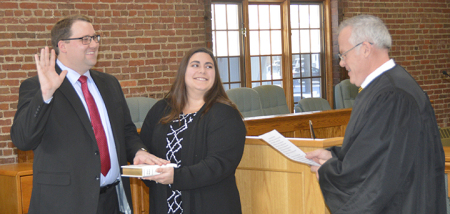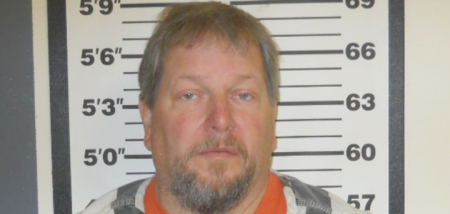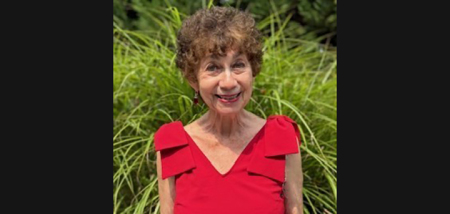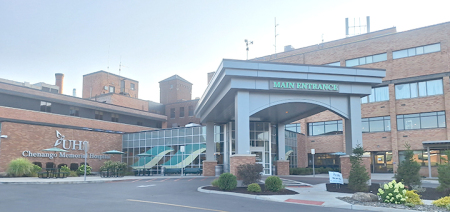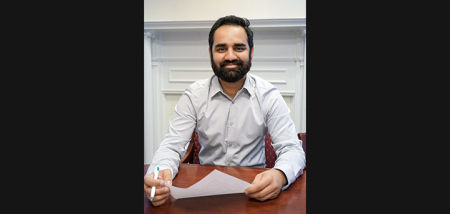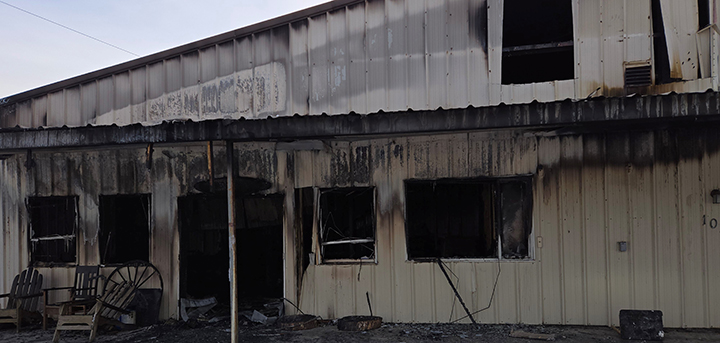Right To An Attorney? Only If They Can Find One
Published:
July 29th, 2022
By:
Tyler Murphy
 Lady Justice atop the golden dome of the Chenango County Courthouse in Norwich. (Photo by Tyler Murphy)
Lady Justice atop the golden dome of the Chenango County Courthouse in Norwich. (Photo by Tyler Murphy)
Chenango County justice faces “least bad option” over staffing shortages
CHENANGO COUNTY – Law enforcement and the courts in Chenango County are struggling with a staffing shortage. Earlier this month, officials reported they may no longer be able to hold court or provide defense lawyers outside of regular, weekday work hours.
The announcement has caused alarm and finger pointing, since New York State criminal procedure law requires that defendants receive arraignments following certain arrests. When these arrests occur late at night or on weekends, the ability to follow those requirements has become difficult for local officials to maintain.
Chenango County Public Defender John Cameron said, “Presently, my understanding is, because of the shortage of people to do arraignments, judges can now do arraignments without an attorney present. We are not providing counsel at arraignments.” He said he hopes the issue will be resolved in a matter of weeks.
After suggesting the practice as a “least bad option,” New York State court officials also warned the county it may not be in compliance with criminal procedure law.
“I understand why they are doing it but I'm uncomfortable with it. We don't have the attorneys,” Cameron said.
The issue has also put renewed focus on the creation of a central arraignment program to handle all initial arrests which could alleviate the issue, but it wouldn’t solve the long-term staffing shortages.
“Generally everyone will be released, thanks to New York State's bail reforms laws; but these are the more dangerous ones, involving circumstance that need immediate attention and are likely people you want to hold in custody,” said Chenango County Sheriff Ernest R. Cutting. “Corrections, police, any local business – everyone, just about everywhere in New York, there is a shortage. There is a brain drain leaving the state, and all businesses and services are suffering.”
The sheriff said his staff was already working overtime and law enforcement across the state had seen a massive exodus of experienced personnel over the last year, citing anti-police protests, defund police politics and bail reforms laws — all of which make being a public servant more dangerous and difficult.
Cutting said, “No matter what, we will do our job. Period. We will conduct our investigations and make the arrests. But this situation is demotivating for law enforcement. The changes in culture and continual protests, it is hugely demotivating for officers.”
The Chenango County Public Defender's Office announced on July 8 that the office had lost another public defender who sought a job in the private sector instead. Beginning on July 14, the office said it would no longer be able to support defendants for arraignments outside of regular hours, 8 a.m. to 4 p.m., Monday through Friday.
Public Defender Cameron said he and the one other public defender currently working criminal cases at the office, which is normally staffed with five attorneys, had both been called back from planned retirements to cover the severe staffing shortage.
Cameron retired several years ago from the position. But after former head of the office Zachary Wentworth took a job as the county attorney and another public defender left that same day, it left behind only one full-time criminal attorney. Cameron and another lawyer were asked to come back to fill the vacancies.
Recently a seperate full-time attorney who had remained after Wentworth's departure decided to take a job in the private sector instead, leaving only Cameron and one other PD attorney, both of which had intended to retire. The county may now need to find staffing for the entire office in the long term and eventually re-fill all five positions.
Cameron said one of the factors in the recent departure was “burnout.”
“So due to short staffing, we sent a notice, as of July 14, that we are unable to do any more off hour arraignments,” said Cameron. “We don't have the staff to come out in the middle of the night to do these.”
Cameron said the office had attempted to draft private attorneys to fill the roles, appointed by the court, but this came at a very high cost, several times more than it would cost to hire a public defender, and many refused to cover off-hour court proceedings anyways. These assigned attorneys are referred to as 18B assignments. They are paid about $75 an hour, but a recent court ruling in New York City may raise these rates to about $158 per hour instead. Despite that potential increase, Cameron said many private attorneys made more than that in the private sector.
In a letter to the court and police on July 8, Cameron wrote, “As you are aware, the attorneys we use for 18B assignments have been unable or unwilling to be on call for after hour arraignments. Thus, only Public Defender Attorneys have handled these arraignments. The loss of attorneys means I must allocate our resources in a way to ensure that principals (our clients) who must appear in regularly schedule courts throughout the county are properly represented.”
Local police were concerned by the prospect of being restricted to only making certain arrests during regular hours and local justices were concerned by the prospect of holding after-hour court proceedings without a defense lawyer present, creating an uncomfortable conundrum for the justice system and a possible threat to public safety.
Cameron said many after-hour cases involved “outstanding warrants and arrests where they have to hold them in custody.”
“I am not happy about this situation at all. We get a ton of calls,” he said. “The job of a defense attorney is to make sure people's rights are protected.”
Local justices and their organization, the Chenango County Magistrate Association, headed by Norwich Town Judge James Fox, reached out to the New York State's Counsel Office and the Office of Justice Court Support, to ask what local judges should do.
Chenango County currently has twenty-six local criminal courts: one city court, four village courts, and twenty town courts, that are presided over by thirty-one local criminal court judges. These courts are spread out over the county’s 900 square miles.
“We are the courts closest to the people,” said Fox. “My concern was for local judges. Court is 24 hours a day, seven days a week. Certain arrests, due to the CPL (Criminal Procedure Law) – Certain offenses have to be arraigned and we get called,” he said.
The state's response to judges was to document an attempt to get a lawyer on the record before going ahead without one. The ultimate decision was left up to each individual judge however, and some did not think they should do that.
The email from the state to judges stated:
“I am aware that the Chenango County Public Defender’s Office has lost of most of its staff and is no longer able to cover after-hours arraignments. In addition there are no 18-b attorneys in your county who are willing to cover after-hours arraignments. I have spoken with both Counsel’s Office and the Office of Justice Court Support and can give the following guidance while we try to solve this situation:
1) If you receive a phone call for an after-hours or weekend arraignment, you should use best efforts to try to obtain an attorney. Those efforts should include calling the public defender’s office to see if there is anyone available, and any 18-b attorneys who may be available.
2)If there are no attorneys available, you should place on the record that you attempted to obtain counsel for the defendant, and you should detail what steps you specifically took to attempt to obtain counsel.
3)You can then go forward with the arraignment without counsel including making a decision as to custody, license suspension and/or the issuance of an order of protection.
4)You must then adjourn the case to the soonest possible date in the court of jurisdiction. If the defendant is in custody the case must be adjourned to the next business day. At that next court date, the arraignment should be done over with counsel present.
“I recognize that this is not a great option, however it appears to be our 'least bad option' at this time. I am hopeful that the Sheriff will provide a letter of support for the CAP( centralized arraignment program) soon so that the county can once again be in compliance with the criminal procedure law.”
The Chenango County board of supervisors and the local magistrates association have endorsed a recent a plan to create a CAP that would make the sheriff's office the arrest booking hub of all after-hour arrests and pay judges who hold such arraignments an extra $250, said Cutting.
Currently judges get nothing extra to cover after hour court proceedings.
But other parts of the agreement could require additional responsibilities for the sheriff's office, such as follow-ups regarding transportation of defendants and long waiting periods for police who could be on patrol.
Cutting said the proposed CAP would pass additional staffing responsibilities to the sheriff's office and would not fix the underlying problem of the lacking number of public defenders.
However he said his office and the courts were close to making an agreement when changes were made, making it more labor intensive for officers who have their own staffing shortage.
“Toward the end, as we were finalizing the agreement, some wanted people transported to Norwich City Court- and move the defendants, that again requires more staffing,” he said.
The sheriff said the courts and public defender's office was passing the buck to local law enforcement.
“We are eventually going to get where we want to be, probably soon – they are pressuring us but it's not the right way to do things. We are at stalemate at this point.”
The new plan proposes a central arraignment office inside the lobby of the Chenango County jail to serve as a courtroom for arraignments by local town and village justices on a rotating basis, and to be staffed by the sheriff’s office.
Chenango County is one of the few counties in New York’s Sixth Judicial Court District without a centralized arraignment program (CAP) which sets specific times, often in 12-hour intervals, for arraignments. Advocates of a local CAP program say it would create a more organized, more predictable arraignment process throughout the county.
As it works now, a typical arraignment in Chenango County starts with a court’s phone call to the public defender’s office and the criminal court judge in the jurisdiction where the crime was committed. If that judge is unavailable, the arresting agency will contact another judge to conduct the arraignment. An attorney is sent to the court handling the arraignment, wherever it may be in the county, during whatever time the call is made. In some cases, this may mean an attorney — or a judge, for that matter — isn’t available until hours later.
The big issue, according to Cutting, is that arresting officers must stay with the individuals they confine until arraignment. If a judge or attorney isn’t immediately available, then the process takes longer, consequently keeping the officer from patrol duties while they wait at the local court. A CAP program would solve this issue because arrested individuals would instead wait for arraignment in the lobby of the correctional facility, supervised by other officers, and the arresting officer can return to patrol.
Cutting has repeatedly voiced concerns about the current process in front of the county’s Safety and Rules Committee, saying that it creates issues with staffing, liability, and the transport of those in custody for arraignment. The sheriff’s office simply doesn’t have the manpower to always handle it, he said.
– Sun Staff Writer Shawn Magrath also contributed to this story
Author: Tyler Murphy - More From This Author
Comments
